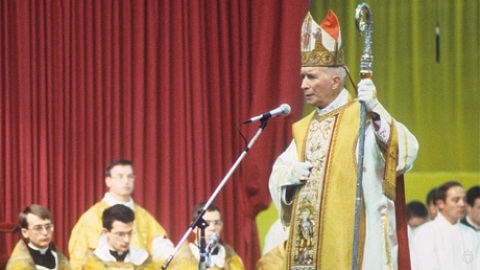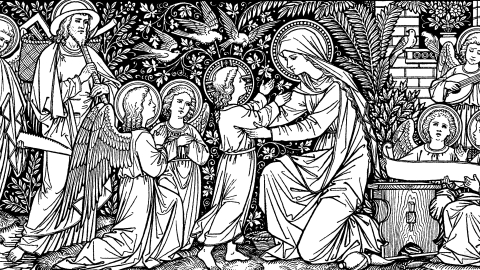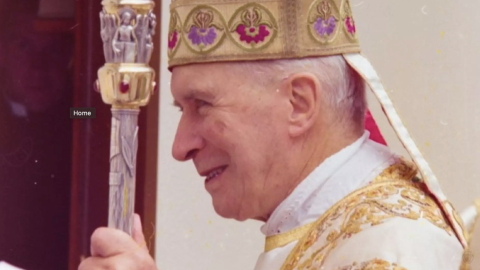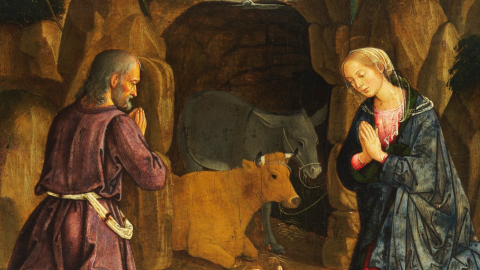Cardinal Kasper’s new morality

Read about Cardinal Kasper's ecumenical sense of moral theology.
We offer these insights from DICI about Cardinal Kasper's ideas on marriage and Communion.
Can divorced and civilly remarried persons be admitted to Eucharistic Communion? Contrary to the doctrine of the Church, Cardinal Kasperthinks that it is possible under certain conditions. Fr. Matthias Gaudron, professor at the Institut Sainte-Marie, in the canton of St. Gall, Switzerland, shows precisely the sophistical arguments on which this supposedly pastoral proposal is based and refutes them vigorously.
Cardinal Kasper’s new morality
Cardinal Kasper’s speech to the Consistory on February 20, 2014, was the opportunity to claim for the “divorced-and-remarried”, at least under certain conditions, access to Holy Communion. In this speech he declared the need for pastoral ministry to the family that is adapted to our age, and within the official framework of the Catholic Church.
In itself this presentation by Cardinal Kasper contains nothing to surprise us. Already in 1993, when he was Bishop of Rottenburg-Stuttgart, he had tried, in a letter written jointly with the Bishop of Mainz, Karl Lehmann, and the Archbishop of Freiburg-im-Breisgau, Oskar Saier, to authorize the reception of communion for divorced and civilly remarried persons by reason of “a responsible decision of the conscience”. But at that time the Sacred Congregation of the Faith categorically refused to approve it.
Instead, what is surprising today is the high praise that Pope Francis gave to Cardinal Kasper’s talk. The Holy Father in particular stated that he had read and reread the cardinal’s speech “before going to sleep, but not in order to go to sleep,” and that he had found in it a “profound theology”, “clear thought”, since the German cardinal’s presentation was for him a model of “theology on its knees”.
In his speech Cardinal Kasper, in a typically modernist style, shifts between “on the one hand” and “on the other hand”, thus obtaining the result that he desires, while appeasing his conscience by an appearance of orthodoxy.
On the one hand, “one cannot propose a solution that differs from or goes against the words of Jesus.” “The indissolubility of sacramental marriage” is an “integral part of the Church’s Faith”.
On the other hand, for the good of the children, we could not separate couples who are married only civilly without burdening them “with a new sin”. All the more so since some even consider this second civil union as a “gift from Heaven”.[1]
If we are to believe the cardinal, one cannot devise a general solution for all cases but rather it is necessary to examine each individual situation. Based on concrete facts, he brings to light the following aspects:
1) “Many pastors are… convinced that many marriages, which were concluded in ecclesial form, are not validly contracted.”[2]
It is indeed possible that many religious marriages are not valid, which is, to tell the truth, a sign of the disastrous state of religious marriage preparation programs. On this subject one author wrote that it generally varies “from the bureaucratic minimum to the patronizing and uninformative”.[3] For such cases there are ecclesiastical tribunals in which one can begin a process of nullity of marriage. This does not lead to “Catholic divorce” but, on the contrary, to an examination of whether or not, in the case in question, the marriage was contracted validly.
2) The wellbeing of the children who are born of this merely civil union makes it difficult for the couple to separate from bed and board.
If the two parties commit themselves to living together in complete abstinence, “as brother and sister”, and there is no risk of scandal, then by virtue of these two conditions, authorization may in fact be given to them to receive Holy Communion.[4]
3) Forbidding access to the sacraments for believers who would like to receive them, calls into question the structural basis of the sacraments of the Church. What good is the Church and her sacraments?[5]
This argument is a pitiful sophism quite unworthy of a Catholic theologian. Divorced-and-remarried persons are living in a state that is against God’s will, and furthermore they refuse to put an end to the situation. Thus they make themselves incapable of receiving God’s forgiveness. For that always presupposes repentance, the very thing from which Cardinal Kasper is trying to dispense them. We do not let a bank robber keep his loot, even if he has gone to prison for a time.
More specifically, the cardinal lists five conditions which, in his opinion, would allow a divorced-and-remarried persons “after a period of reorientation” (metanoia) to obtain absolution from his sins by the Sacrament of Penance, then to receive Holy Communion:
- if he repents of the failure of his first marriage;
- if he has clarified the responsibilities connected with his first marriage and if a return to that first union is absolutely ruled out;
- if he cannot, without new guilt on his part, free himself from the responsibilities incurred during his second civil marriage;
- if he strives to live in this second civil marriage on the basis of faith and to educate his children in the faith;
- if he expects from the sacraments special strength to help him in his present situation.[6]
Even if these conditions were applied strictly—which is probably a pipe dream given the current state of pastoral ministry—it follows that this proposal by Cardinal Kasper would allow someone who is living in adultery and wants to remain in it to be absolved of his sins and to receive Eucharistic Communion. This can be interpreted in two ways: either he is now allowed to receive communion in a state of grave sin, or else it is no longer considered gravely sinful to have marital relations outside of a true marriage.
Actually, Cardinal Kasper’s considerations seem to tend toward the second solution. In an interview with the journalist Andrea Tornielli dated September 18, 2014, he in fact declared:
Couldn’t some elements of sacramental marriage also be recognized in civil marriages in certain cases? For example, the lifelong commitment, mutual love and care, Christian life and a public declaration of commitment that does not exist in common-law marriages."
This means that in a good civil marriage—especially when it is contracted by persons of faith—we can find some elements of Christian sacramental marriage. Not that the two must be put on an equal footing; nevertheless the civil union is not bad in itself, but simply less good! Until now Catholics spoke about good or bad actions, about living in the state of grace or in mortal sin. Now nothing is left but good actions and less good actions. Lifestyles that totally espouse the Christian ideal and others that correspond to it only partially!
Cardinal Kasper supports his ideas by drawing a parallel with the new ecclesiology of Vatican II:
Church doctrine is not a closed system: the Second Vatican Council teaches us that there is a development, meaning that it is possible to look into this further. I wonder if a deeper understanding similar to what we saw in ecclesiology, is possible in this case: although the Catholic Church is Christ’s true Church, there are elements of ecclesiality beyond the institutional boundaries of the Church too."
Before Vatican Council II, the Church taught that the non-Catholic Christian denominations were not within the bosom of the true Church and therefore were not part of the Church of Jesus Christ. The expression “subsistit in” in Lumen gentium (8) opens up a way to recognize them as partial realizations of the Church of Christ. Non-Catholic denominations, not having the richness of the Catholic Church, are therefore not as good, but they are not bad in themselves: you do not separate from Christ, but you are less well united to Him!
This is exactly what the Relator General of the Extraordinary Synod of Bishops, Cardinal Peter Erdo, said in his intermediate report on October 13, 2014:
A significant hermeneutic key comes from the teaching of Vatican Council II, which, while it affirms that ‘the one Church of Christ subsists in the Catholic Church,’ also recognizes that ‘although many elements of sanctification and of truth are found outside of its visible structure …these elements, as gifts belonging to the Church of Christ, are forces impelling toward Catholic unity’ (Lumen gentium, 8). In this light, the value and consistency of natural marriage must first be emphasized. Some ask whether the sacramental fullness of marriage does not exclude the possibility of recognizing positive elements even the imperfect forms that may be found outside this nuptial situation, which are in any case ordered in relation to it. The doctrine of levels of communion, formulated by Vatican Council II, confirms the vision of a structured way of participating in the Mysterium Ecclesiae by baptized persons. In the same, perspective, that we may consider inclusive, the Council opens up the horizon for appreciating the positive elements present in other religions (cf. Nostra aetate, 2) and cultures, despite their limits and their insufficiencies (cf. Redemptoris missio, 55)."[7]
But we have not reached the end of our difficulties. Even homosexual communities can possess “positive elements”, as Cardinal Kasper declared on May 22, 2014, in defending the referendum on homosexual “marriage” in Ireland. In an interview with the German television network ARD on October 15, 2014, he added that positive elements can be recognized in a marriage between homosexuals, even though that was never the model followed by the Catholic Church.
In this way, Jesus Christ and His Church become one optional offering among the many different religions and lifestyles. As in all religions, one can perceive something good in each person and in each lifestyle; thus everything becomes a path or a way to salvation.
In reality, someone who has acknowledged the truth of the Catholic Faith yet does not want to enter the Catholic Church will not be saved. Even Vatican II affirms this: “Hence they could not be saved who, knowing that the Catholic Church was founded as necessary by God through Christ, would refuse either to enter it, or to remain in it” (Lumen gentium,14). Those who believe in other religions can be saved, therefore, only if they live in error by no fault of their own and they do what their conscience tells them. Similarly, those who knowingly disobey God’s commandments are not in God’s grace. Whatever naturally good qualities and actions remain in them make their life less bad than if they had gone totally astray from the truth and love; nevertheless this is not good in itself!
It is impossible to deny that Cardinal Kasper’s speech displays a certain consistency in its application of conciliar ecumenism to the moral teaching of the Church. He neatly shows where it all leads when falsehood is no longer called false but only less true, and when what is bad is no longer really bad but only less good.
Fr. Matthias Gaudron
Footnotes
1 Cardinal Walter Kasper, The Gospel of the Family, translated by William Madges (Mahwah, NJ: Paulist Press, 2014), Section 5 (Location 379 of e-book).
2 Ibid., Section 5 (Location 402).
3 John M. Rist, “Divorce and Remarriage in the Early Church: Some Historical and Cultural Reflections”, in Remaining in the Truth of Christ (San Francisco: Ignatius Press, 2014), 64-92 at 66.
4 Cf. Cardinal Velasio de Paolis, “The Divorced and Civilly Remarried and the Sacraments of the Eucharist and Penance”, in Remaining in the Truth of Christ (San Francisco: Ignatius Press, 2014), 181-209 at 186.
5 Cardinal Kasper, The Gospel of the Family, Section 5 (Location 429).
6 Ibid., Location 452.
7 Relatio post disceptationem, nn. 17-19.





